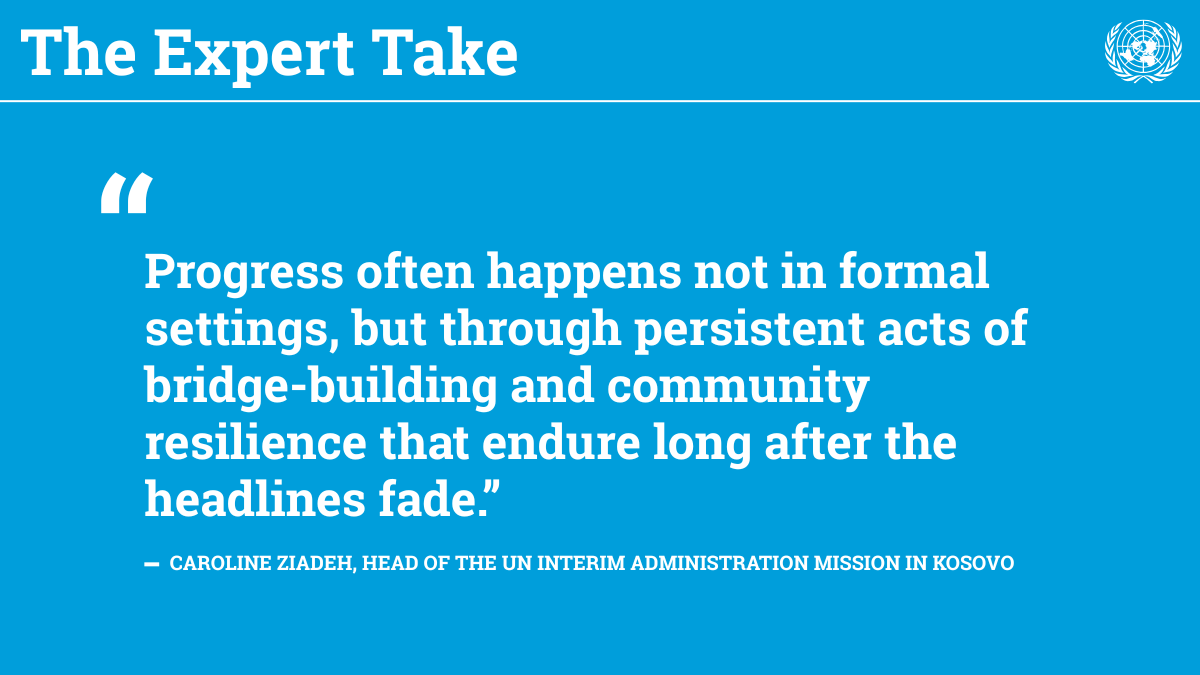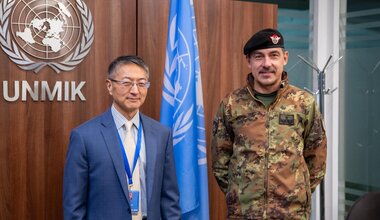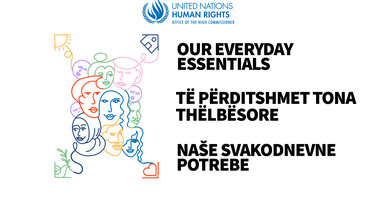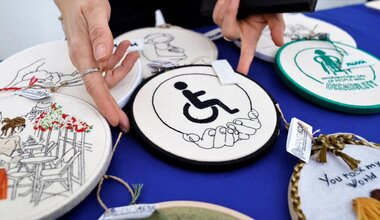Caroline Ziadeh: Peacekeeping is not just about presence; it is about purpose
In this Expert Take, Caroline Ziadeh, Head of the United Nations Interim Administration Mission in Kosovo (UNMIK) reflects on the challenges and quiet successes of peacebuilding since taking up the role in 2019. Drawing on her extensive career in post-conflict diplomacy—including her time as Lebanon’s Deputy Permanent Representative to the UN—Ziadeh emphasizes the importance of community-led initiatives, the inclusion of women and youth, and trust-building across Kosovo’s divided society.
As she concludes her tenure, Ziadeh calls on the next generation of peacebuilders to embrace patience and purpose, reminding us that lasting peace often begins at the margins, not in the spotlight.
Question: Over the past three years, you have led one of the UN’s peacekeeping missions at a time of continued geopolitical friction and delicate internal dynamics. When you reflect on your tenure, what moments, big or small, most vividly illustrate the path of trust-building and engagement with communities on the ground? Was there a particular turning point, or a quiet gesture, that helped unlock a broader shift?
Caroline Ziadeh:
Looking back over the past three and a half years, what remains most vivid are not the formal milestones or political meetings, though those have their place, but the quieter, more human moments where trust, often elusive, begins to take shape in tangible ways.
One such moment was the inauguration of the Barabar Centre in Pristina. This was not simply the opening of a building but the culmination of years of listening, convening, and encouraging communities to engage on their own terms. What made it truly powerful was that the center was created not by the UN, but in partnership with local organizations, Integra and CASA, representing different parts of Kosovo and choosing to lead together.
I recall standing at the event, looking out at a room of over 250 people, from grassroots activists and youth leaders to international experts and officials and thinking, this is what a real change looks like. For a moment, the usual divides receded, replaced by a shared sense of ownership and purpose. Not because we told people to trust each other but because we created a space where they could choose to do so.
Of course, trust is not built in a single event. It is nurtured, through consistency and presence. It has been now two years since the center’s opening, and it has expanded significantly, hosting over 220 multiethnic events attended by more than 17,000 people. That moment underscored for me that when you place faith in local leadership and support communities in defining their own path forward, you unlock something far more sustainable than any externally driven process. Trust is not a gift given; it is a choice made. And when people make that choice together, it changes everything.
Another memorable moment for me was the unveiling of a mural on gender-based violence , created by youth from diverse communities. Standing together as the artwork was revealed, I saw how a simple wall in the heart of Pristina had become a powerful symbol of awareness and shared commitment to change—a moment that reminded me of the impact of community-led action and the importance of giving young people a voice.
UNMIK has supported several trust-building initiatives that bring people together through music, art, sports, and community activities. In the Mitrovica region, the Mitrovica Jazz Festival created a space where people from all backgrounds came together through the shared language of music. At a local football camp supported by UNMIK, children from different communities played and built friendships.

Question: Kosovo continues to straddle a fragile balance between institutional progress and underlying tensions. In your view, what have been the most consequential developments in advancing peace and stability, and what hard-earned insights have emerged about the limits and possibilities of peacekeeping in such a politically sensitive environment?
Caroline Ziadeh One of the most sobering lessons of this role has been that progress in peacekeeping does not always appear as breakthrough agreements or public reconciliation. Sometimes, it is quiet and persistently keeping essential spaces open, especially when the political climate threatens to close them.
A prime example is our work on the Working Group on Missing Persons (WGMP). While it rarely dominates headlines, I consider it represents one of the most consequential peace support platforms in Kosovo today. It remains one of the few functional forums that bring Pristina and Belgrade together in humanitarian concern, focusing on the dignity of the victims and the rights of their families.
From the start of my tenure, safeguarding this space has been a professional and personal priority. Through our Human Rights Office, UNMIK continues to provide technical and political support to ensure the WGMP remains active even when higher-level dialogue falters. I have seen firsthand how essential it is to maintain this humanitarian focus as the issue of the missing persons becomes increasingly entangled with wartime accountability, archival access and contested narratives.
This shift has brought challenges. Trust has been eroded, cooperation slowed, and the departure of partners like the International Committee of the Red Cross, whose neutrality was central has added uncertainty. But when others scale down, we must step up, not to replace but to sustain. UNMIK’s long-standing presence and neutrality enable us to serve as a backstop for this delicate work.
What is clear to me is that technical dialogue on issues like archival access or identification can only progress if anchored in the lived experience of families. Their needs cannot be subsumed by political gridlock. That is why I have continually advocated for a victim-centered approach, ensuring families are informed, supported and heard, not just symbolically but structurally.
The limits of peacekeeping in contexts like Kosovo are often defined by mandate and politics. Yet the possibilities lie in the spaces we protect, the voices we amplify and the diligent work we refuse to abandon even when progress is slow.
Question: You have consistently elevated the role of inclusion in peacebuilding, particularly through the , and Youth, Peace and Security (YPS) agendas. How have these frameworks translated into tangible outcomes at the local level, and what does meaningful implementation look like when communities themselves are at the center of the process?
Caroline Ziadeh:
Inclusion is not just a principle, it is a practice that must be continually renewed especially in a context like Kosovo where the legacies of conflict still shape who speaks, who is heard, and who leads.
From my earliest days as the UN Secretary-General’s Special Representative, it was clear that women and youth were not just stakeholders, they were already peacebuilders, often leading quietly from the margins. My role, and the mission’s, has been to bring those efforts to the center, not as a gesture but as a recognition of what sustainable peace requires.
Over the past year, this commitment has moved from policy to practice. Through the WPS and YPS agendas, we have supported dozens of community-level initiatives including 36 programmatic activities and 23 trust-building projects that place women and youth not just at the table but often at the head of it. These are not one-off engagements, they are designed to build leadership, foster networks and change norms over time.
One memorable example was the series of the Global Open Days on Women, Peace and Security. Far from ceremonial, these forums provided a working space where women from all walks of life, including non-majority communities, offered concrete recommendations to reshape local politics, improve gender-inclusive policymaking and confront daily barriers. Their clarity and insistence were striking: this agenda is not about symbolism but about structure, power and representation.
A rewarding experience for me was being part of the Future Leaders Mentorship Program, launched by UNMIK in partnership with UN Women Kosovo and the University of Pristina. Seeing 25 young women connect with experienced mentors, grow their leadership skills, gain confidence, and build strong networks was inspiring.
Another highlight was the annual UN Youth Assembly , which brings together young people from across Kosovo and the region who are passionate about making a difference. This inspiring forum encourages youth to share ideas, develop leadership skills and take meaningful action toward a better future. Through lively discussions and projects, these young leaders are shaping positive changes in their communities and demonstrating the power of youth to drive Kosovo’s progress.
I have always said peacekeeping today is not just about presence; it is about purpose. Purpose means deliberately and persistently creating space for those long been excluded. It means listening with humility, acting with consistency and investing with the understanding that inclusion is not charity, it is strategy. When I see progress, from local NGOs, driving economic resilience for women to youth-led dialogues breaking ethnic silos, I see the future of peacebuilding in action. It is slower, yes, but deeper and owned by the people it is meant to serve.
Question: As someone who has worked across post-conflict and deeply divided societies, how have your experiences shaped your work? In moments of stalemate or silence, what personal lens helped you stay grounded, and how did it inform your ability to navigate the social and historical fault lines in Kosovo?
Caroline Ziadeh:
Working in post-conflict, divided societies teaches that progress rarely follows a straight line. The path is often winding, sometimes painfully still. There are long stretches where nothing moves. Dialogue stalls. Trust frays. In those moments, it is easy to feel the weight of history pressing in from all sides.
But over the years, I have learned to value those pauses, to listen closely to what is not said. In trauma-marked places, silence is not absence but testimony. It carries grief, mistrust and unspoken truths. If we resist filling that silence with our narratives, it can guide us toward what comes next.
What has kept me grounded is a commitment to consistency and showing up, especially when talks stall or tensions rise. I also deeply believe in listening before speaking. Kosovo’s social and political fabric is extraordinarily complex. Navigating it requires shedding assumptions, investing time, earning trust and understanding that every community carries a different memory of the same events.
That means building quiet relationships, meeting people where they are and letting community leaders, survivors and youth show where the real work lies, not just at negotiation tables, but in classrooms, women’s cooperatives, youth groups, and information networks where reconciliation either takes root or recedes.
I have learned that progress often happens not in formal settings, but through persistent acts of bridge-building and community resilience that endure long after the headlines move on. This insight has guided my leadership, focusing not only on political engagement but on nurturing the grassroots connections that sustain peace.
Question: As you hand over the reins and step into the next chapter of your journey, what legacy do you hope to leave, not only for the mission, but for the region and the people who placed their trust in this institution? And what guidance would you offer to those, especially young peacebuilders, who will carry this work forward in a world where multilateralism itself is under strain?
Caroline Ziadeh:
As I prepare to hand over this responsibility, my thoughts turn not to headlines or handshakes but to the moments when trust begins to grow.
If there is one legacy I hope to leave, it is of reliability and commitment: an institution that was present, that listened, and that remained engaged even when the way forward was unclear. I hope the people of Kosovo see UNMIK not as a distant bureaucracy but as a steady partner dedicated not only to political progress but to human dignity and inclusion.
During my time here, I have worked to create spaces for dialogue and for youth and women to lead on their own terms. I have sought to protect fragile but vital spaces. Above all, I have aimed to ensure the mission supports communities side by side, not ahead of them. If this spirit of shared ownership remains part of UNMIK’s DNA, then I will be deeply grateful to have contributed to it.
To the next generation of peacebuilders, especially those just starting out: do not view silence as failure, or slow progress as lack of impact. Much of peacebuilding happens quietly, in listening, in the long-term effort to build trust. Our role is not to have all the answers but to keep supporting the process until local solutions can flourish independently.
I leave this role with immense gratitude to the people of Kosovo, to partners and colleagues, and for the trust that made this work possible. While challenges remain, Kosovo has taught me that resilience endures, even in divided societies, and with respect and care, it can lead the way forward.
 UN
UN United Nations Peacekeeping
United Nations Peacekeeping





